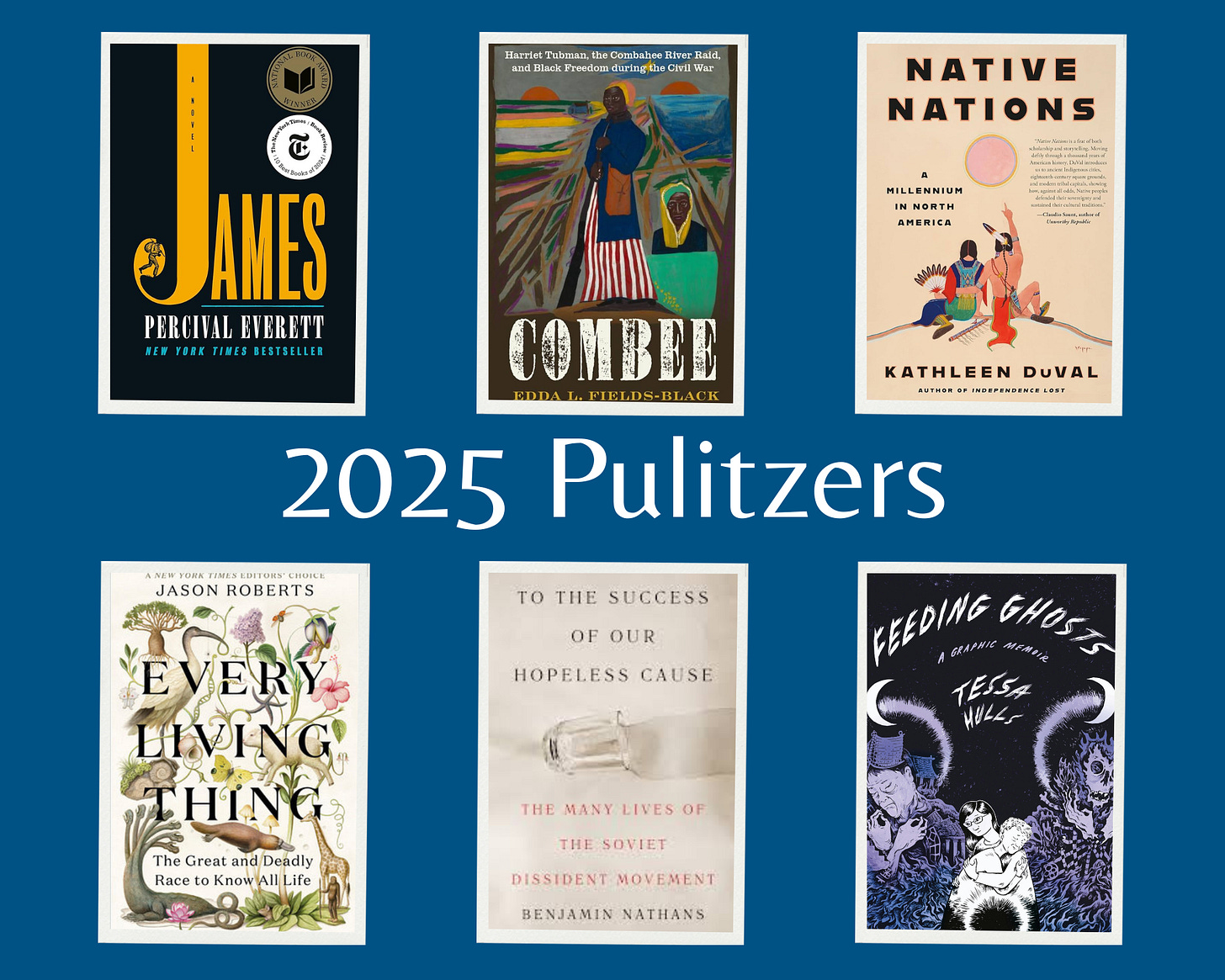What to Read Next: May 9, 2025
Issue #377, featuring a special Pulitzer rundown
Hello readers!
On Monday, the Pulitzer Prize board handed out the most prestigious awards in the book business. Since I embarked on my Pulitzer Project two years ago, Pulitzer week has become one of my favorite weeks on the literary calendar.
I’ve said it before, but it’s worth repeating: literary prizes are not necessarily about determining the “best” books. To me, they are always fascinating for what they say about American culture in that moment. This reading project had added incredible richness to my intellectual life and even when I don’t enjoy the book itself, I always appreciate the thought exercise that comes with it.
Though there are nearly two dozen categories across journalism and letters, here are this year’s winners in the bookish categories:
Fiction: James by Percival Everett
History: Combee: Harriet Tubman, the Combahee River Raid, and Black Freedom During the Civil War by Edda L. Fields-Black
History: Native Nations: A Millennium in North America by Kathleen DuVal
Biography: Every Living Thing: The Great and Deadly Race to Know All Life by Jason Roberts
Memoir: Feeding Ghosts: A Graphic Memoir by Tessa Hulls
General Non-Fiction: To the Success of Our Hopeless Cause: The Many Lives of the Soviet Dissident Movement by Benjamin Nathans
(Take a look at the spreadsheet and keep up with my progress here.)
In this week’s newsletter, I wanted to share some random thoughts on this year’s winners.
Thoughts and Notes on the 2025 Prizes
In some ways, James was a shoe-in for the Fiction prize. It had already cleaned up through award season so far, having won the National Book Award, Kirkus Prize, and Audie Award (for best audiobook); it was also a finalist for a handful of other awards, including the prestigious Booker and PEN/Faulkner prizes.
And yet, because of its enormous haul already, I actually thought the door was open for someone else to break through. It’s rare that we get to Pulitzer season with a book this well-regarded (though Demon Copperhead was similar a couple of years ago). By awarding James this prize too, it all but guarantees that Everett’s novel will be considered an instant American classic for decades to come.
Rather than highlighting a different voice in American fiction, the Pulitzer board decided to further cement James’ already esteemed legacy — a decision that isn’t without some controversy. The jury (comes up with finalists) and the board (decides on the winner) seem to have at least somewhat disagreed; you can read the juicy details here, if you’re into the juicy details of literary prizes.The History prize has historically been a challenging category. Many of the picks, especially in the early 20th century, catered to a white, imperialist view of history. Recent decades have seen a (much-needed) greater focus on the history of Black America, but recognition for this country’s Indigenous history has still been lacking. So I was glad to see Native Nations win a share of the award. I look forward to reading this story of how “Indigenous Americans built diverse civilizations and adapted to a changing world.”
I had previously heard of Every Living Thing, this year’s Biography prize winner, but wasn’t familiar with the book’s subjects: naturalists Carl Linnaeus and Georges-Louis de Buffon. In the seventeenth century, these men sought to categorize, well, every living thing on the planet. I appreciate that the honor went to subjects who aren’t very well known; too often the prize goes to a biography of someone already wildly famous. MLK, Malcolm X, J. Edgar Hoover, and George Washington have been subjects in recent years — not to say that those books and subjects aren’t worthy, but they can feel less fresh and exciting.
I had not heard of To the Success of Our Hopeless Cause, a book about Soviet dissension, but its selection is not surprising. The General Non-Fiction category could also be broadly described as “Current Events.” Recent winners in this category include books about Gaza/Palestine, George Floyd, fracking, and climate change. It looks like a big book and I’m excited to read it.
Finally, it was really interesting to see a graphic memoir, Feeding Ghosts, win the Memoir/Autobiography category, which has only been around for three years. The “graphic” segment of books has picked up serious steam in recent years, but that shift has not been reflected in literary prizes. Maus is still one of the only graphic stories to have won a major prize, and even that was a “Special Citation” rather than a true category winner.
Overall, this looks to be an excellent selection of books and I’m really looking forward to reading all of them!
Thanks so much for reading. Be good to each other.
-Jeremy


I quite liked James but I didn't love it. I found it fascinating to read that James was only able to win because the top four choices were all too polarizing to be able to unite the judges and win.
Is "James" on the radar for The Big Read? It would be a good addition to our reading, especially since we are reading "Huckleberry Finn" now.